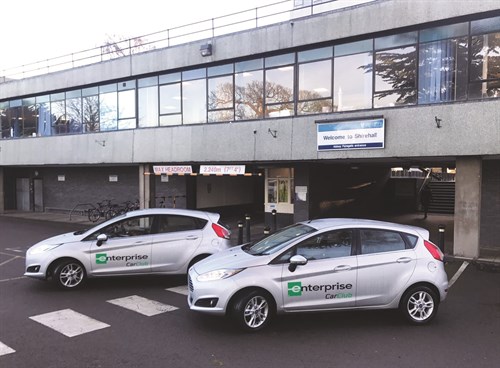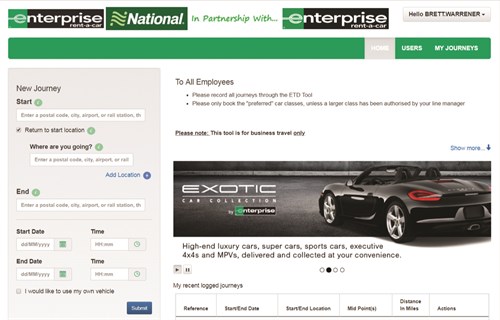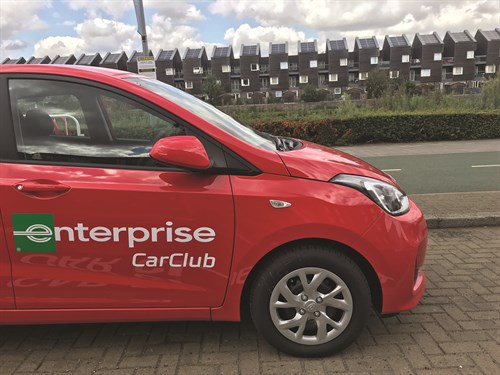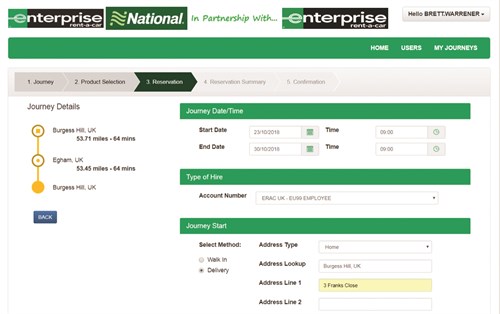We use cookies to ensure that we give you the best experience on our website. If you continue without changing your settings, we will assume that you are happy to receive all cookies on the Business Car website. However, if you would like to, you can change your cookies at any time

The start point for the best source of fleet information |
Reducing the burden of grey fleets
Date: 13 June 2019 | Author: Rachel Boagey

Driving on business is typically one of the most dangerous activities your staff undertake, and businesses have a duty of care to ensure drivers are safe and that risks are mitigated.
Employers must be satisfied that all vehicles used in conjunction with business are properly maintained to an acceptable and safe standard, and grey fleet vehicles need to be managed as diligently as company-owned or leased vehicles.
But how do you form your company policy to ensure that you are ticking all of the boxes in terms of grey fleet - and does it make sense to begin to attempt to cut your grey fleet mileage?
"As a bare minimum, comprehensive policies must be in place, and understood and agreed to by anyone driving on business," Paul Hollick, managing director at The Miles Consultancy (TMC), tells us. "Agreement to adhere by these policies should be documented. Driving licences should be checked regularly - those with points on their licence should be checked more frequently than those without. Employees should be asked for a record of the vehicle's last service and MOT, and be prompted to carry out (and document) regular maintenance checks - tyres, wipers fluids, etc.

"A copy of the vehicle's insurance document should be checked to ensure that it covers business use before employees can drive on business."
Adrian Bewley, assistant vice-president of business mobility for the UK and Ireland at Enterprise Rent-a-Car, agrees.
"Managing duty of care on the grey fleet can be tricky," he says. "To effectively manage grey fleet vehicles, it is advisable for fleet managers to have a policy in place that addresses health and safety, environmental impact and financial impact arising from claim inflation of emission zone charges.
"Many fleet managers are looking for ways they can carry out assessments, making sure employees are in well-maintained vehicles suitable for business use, with the correct insurance. It is often vital to have a suitable audit trail."
The BVRLA has recently urged bosses and policymakers to get to grips with grey fleet by targeting a 50% reduction in mileage and costs by 2020. A new BVRLA report provides detailed information on reducing grey fleet mileage including a step-by-step guide for organsiations wishing to reduce grey fleet usage. The 'Getting to Grips with Grey Fleet' report estimates that around 200 incidents involving someone at work cause injury or death on the road each week. Road accidents are the biggest cause of work-related accidental death and pose the greatest risk to fleet managers who fail to have effective checks and monitoring processes in place.

The report, which estimated the size of the UK grey fleet market at just over 11.5 million, suggests that there is considerable potential for both public and private sector organisations to reduce grey fleet use, achieving a step change in cost control, employee safety and reduced environmental impact.
Venson Automotive Solutions has shown support for the BVRLA's call for best practice guidance, and highlights salary sacrifice schemes as a possible solution.
"We welcome this report and the BVRLA's call for businesses to take action and the government to offer much-needed support," explains MD Samantha Roff. "The figures reveal the scale of the problem, which is the first step to recognising the need to act now."
Venson believes salary sacrifice schemes can offer a partial solution to reducing the burden of grey fleets.
"However, our own research of grey fleet drivers reveals that almost 60% would not take up the offer of such a scheme if their employer offered one," says Roff. "This suggests that the wider cost and environmental benefits are not generally understood, so businesses and fleet managers need to undertake a greater role in educating employees.
"The government has a role to play in promoting the alternatives to grey fleet use and should be delivering best practice guidance, helping the public and private sectors make positive changes. Employees driving salary sacrifice cars will have new cars with lower CO2 emissions, supporting best practice and duty of care, as well as the environmental objectives of the business."
There is certainly less control over grey fleet vehicles in terms of their suitability and safety, and businesses don't have the same visibility of the drivers' behaviour as when driving a company-owned vehicle since they won't receive telematic feeds or other data that indicates how well an employee is driving, says TMC's Hollick.

"But for companies with a comprehensive occupational road risk strategy in place, the management of grey fleet isn't a great deal more difficult than management of company vehicles," he says. "Grey fleet drivers just require a few more checks in terms of ensuring vehicles are insured for business use and that they are roadworthy by checking they are serviced regularly and that MOTs are up to date."
Checks should also be put in place for employees who receive a cash allowance to ensure any stipulations are being adhered to - for example, if your cash allowance policy states that cars have to be under five years old, this should be checked, says Hollick.
While there are many tools available that can help fleet managers with grey fleet, there are often issues with private cars that make them inappropriate for business use.
"Personal cars tend to be older than leased or rented vehicles," says Bewley. "That means they might not have the latest safety equipment compared with a hire car that is often less than a year old. And it is often very difficult for businesses to confirm that grey fleet cars are regularly serviced and suitably maintained."
Bewley explains that this can present a significant health and safety challenge, "which is why so many fleets look for alternatives such as car clubs or daily rental. This can be particularly valuable for employees who might not drive enough to warrant their own company car," he says.
He also explains that reducing all business mileage can be important in terms of cutting costs and emissions, both for public sector bodies and companies.
"Reducing the mileage in grey fleet can be particularly valuable because longer trips in particular are often more cost-effective in alternatives like rental cars," he says. "Mileage reimbursement can also have considerable admin costs as fleets try to manage a blizzard of receipts.

"We have worked with a number of organisations at the strategic, consultative level to help them cut mileage, especially in grey fleet vehicles," he adds.
Bewley believes it is important to analyse journey data in minute detail and determine how, where, when and why people travel for business, so that it is then possible to find ways to do so more efficiently.
Other forms of mobility such as rental and car clubs can be one way around the grey fleet dilemma, he notes.
Terry Bartlett of Inchcape Fleet Solutions agrees, saying that setting a limit on the amount of mileage a grey fleet driver can undertake can help manage expenses, based on the Approved Mileage Allowance Payment.
"Beyond a certain limit, a daily hire car can be more cost-efficient for these users, and for longer trips, use of public transport can be required," he notes.
"Where ad hoc drivers are frequently covering long distances, an organisation should be looking at why they don't have a company car, or the option to take a cash allowance."
Enterprise's ETD tool enables employees to compare the actual cost of a specific journey at a determined time, depending on whether they use a private vehicle and recharge mileage, a car club or a daily rental car.
"Employees can then choose the best option, such as selecting the lowest rate or the most sustainable choice, depending on the company's travel policy, which is programmed into the system to ensure complete compliance and control," he says.
In addition, more companies are looking into multi-modal services and Mobility-as-a-Service (MaaS) apps, so employees can potentially book travel on trains, buses and trams, and locate car club cars, all within a single booking tool.
"We are moving away from the traditional 20th century forms of business travel and into a new world where mobility is available and accessible 24/7 through multiple touchpoints as, where and when people want," says Bewley.
So are we approaching the end of the road for grey fleet?
"A lot of grey fleet mileage is reducing across the public and private sector, because the issues of managing costs, emissions and duty of care can often outweigh any of its benefits," explains Bewley.
Therefore, more and more organisations may be looking to move away from mileage reimbursement over the coming years.
However, Honda is predicting almost the opposite, saying that the 2019 fleet sector will see an increase in the popularity of grey fleet and end-user purchasing.
The manufacturer says it is making the prediction following a 7% decline in the fleet new car market during 2018, as reported by the Society of Motor Manufacturers and Traders.
Fleet sales operations manager Marc Samuel believes fleet procurement is changing and for many, last year's decline in sales will not come as a huge surprise.
"Some organisations have made the traditional, professional fleet manager job redundant in recent years, augmenting the position to be responsible for multiple other areas as well as vehicles - and in several examples we have found companies
have turned away from fleet solutions altogether," he says.
"In place of these solutions, we are seeing more professionals using their own cars for business travel and end-users assuming more responsibility for fleet management."
According to Hollick, businesses should be looking at the most efficient way to move employees from A to B - whether that be via a company car, taxi, hire car, train, tram or bus.
"Some businesses now operate a mobility budget in place of a company car or car allowance," he says. "The benefits of this are reduced cost, improved productivity (employees may be able to work on the move if they are not driving) and there can be environmental benefits too."
Companies should therefore be looking at the best way for employees to travel. Considerations that help decide 'the best way' could include: safety; speed, efficiency and convenience; cost; and environmental impact.
"The mode of transport will differ for each journey and employee, and there are tools out there that identify the most efficient form of transport for the journey," Hollick says.
With the number of company car drivers dwindling, Hollock believes grey fleet will be around for some time.
"However, it may be in a slightly different guise to the 8.2-year-old vehicles that typically make up grey fleet today," he says. "A good solution, and one many businesses are moving towards, is employee car ownership schemes. These are becoming increasingly attractive to businesses and employees alike as they allow businesses to maintain control of the age and type of vehicles employees drive on business, whilst employees are not punished by the company car tax regime."
In future, therefore, the grey fleet will continue to be of concern to all organisations. Those privately-owned vehicles used by employees while 'at work' are difficult to manage in terms of meeting any organisation's basic duty of care - not to mention corporate social - responsibilities.
Fleets need to have measures in place to ensure that grey fleet vehicles are fit for purpose, roadworthy, properly maintained, taxed and insured, but that is not always the case.
Many believe fleet policy should seek to reduce all 'at work' journeys to a minimum by conducting a series of pre-journey assessments, challenging whether the journey is really necessary.
If it is, the most economic form of transport should be chosen and car sharing considered.











